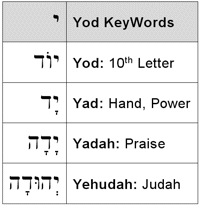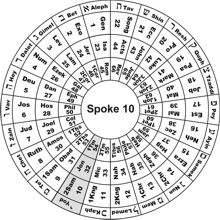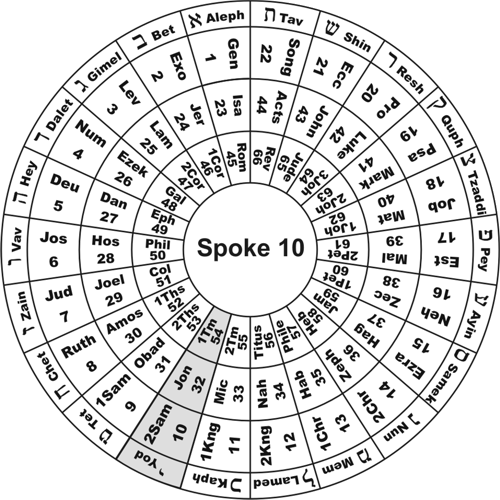David: The King of Israel and Judah
So all the elders of Israel came to the king to Hebron; and king David made a league with them
in Hebron before the LORD: and they anointed David king over Israel. David was thirty years old
when he began to reign, and he reigned forty years.
In Hebron he reigned over Judah seven years and six months: and in Jerusalem he reigned
thirty and three years over all Israel and Judah.
2 Samuel 5:3ff (Spoke 10, Cycle 1)
 The singular theme of the Tenth Book is the reign of King David, the first good King of Israel
and prototype of the Lord Jesus Christ, the Son of David and King of kings. Its position in the canon exemplifies,
with the greatest possible lucidity, the meaning of Yod as the symbol of power,
might, ability, and authority
(see The Hand of the Eternal King). David was from the tribe of Judah (Yehudah) and
as the author of many Psalms, he was famous for his ability to praise (yadah) the Lord.
Halley's Bible Handbook expressed its central theological significance under the title "David, the
Head of an Eternal Dynasty of Kings" (the capitalized emphasis is from the original): The singular theme of the Tenth Book is the reign of King David, the first good King of Israel
and prototype of the Lord Jesus Christ, the Son of David and King of kings. Its position in the canon exemplifies,
with the greatest possible lucidity, the meaning of Yod as the symbol of power,
might, ability, and authority
(see The Hand of the Eternal King). David was from the tribe of Judah (Yehudah) and
as the author of many Psalms, he was famous for his ability to praise (yadah) the Lord.
Halley's Bible Handbook expressed its central theological significance under the title "David, the
Head of an Eternal Dynasty of Kings" (the capitalized emphasis is from the original):
Here in this 7th chapter of II Samuel, begins the long line of promises that
DAVID'S FAMILY should reign FOREVER over God's people; that is, there should come from David an
Eternal Family line of Kings, culminating in ONE ETERNAL KING.
The Handbook goes on to list many of the promises, beginning with "Thy throne shall be established forever"
(2 Sam 7:16). This is the ultimate meaning of the Tenth Book; it established the fundamental typology of Christ as
the Son of David and King of kings, the Ruler of the Universe who possesses all authority and power and sits at
the right hand of God. This theme manifests with unparalleled clarity in 1 Timothy, the third Book on Spoke 10, as
explained in Christ, The King of Kings.
|



